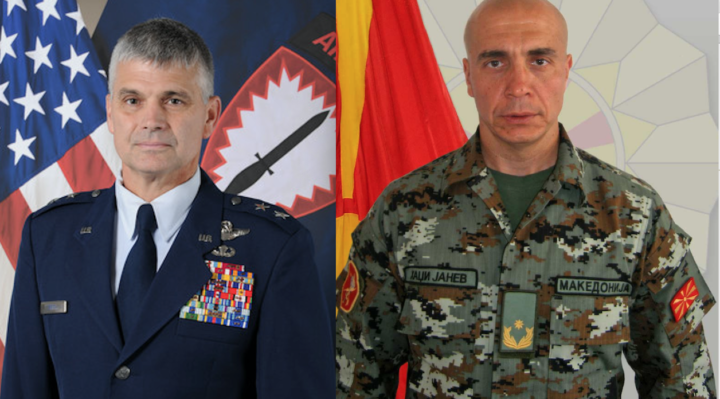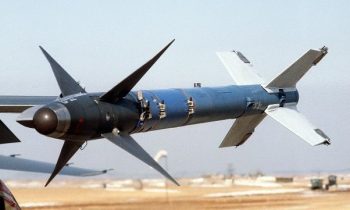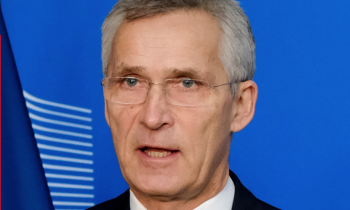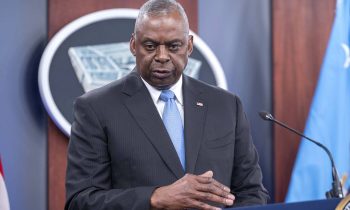In the case of North Macedonia, Russia was widely exposed as conducting malign activity and malicious cyber behavior to disrupt the referendum on the Prespa Agreement and their path to NATO membership said Major General Kirk W. Smith.
From a military perspective, the best way to counter these challenges is to demonstrate that our respective forces are ready, lethal, and able to work together as a combined joint force. What’s more, we need to make clear our relationships consist of more than just words, and we will continue to reinforce them at venues like this across Europe regularly every year.

This and similar exercises and events represent clear proof of the value that NATO and allies can bring to the Republic of North Macedonia in these challenging times. Coming from a country that is about to joint NATO and become a full member, I could not ask for a better opportunity to strengthen and establish the relationships from the deployments and training as a partner, and deepen and increase those relations, trust and our ability to work together as we are studying to become an ally.
Both Ottoman tradition and Slavic heritage provide us with the leverage to understand the complexity and dynamics among the asymmetric and near-peer threats to NATO coming from south and east , Brig. Gen. Hadji-Janev said.
Below is a full rush transcript of the press conference by Major General Kirk W. Smith (USAF)Commander, Special Operations Command – Europe (SOCEUR) and Brigadier General Metodi Hadji-Janev Special Operations Commander Army of the Republic of North Macedonia.
Maj. Gen. Smith: Thank you for taking the time this afternoon with us, I’m U.S. Air Force Major General Kirk Smith, Commander of U.S. Special Operations Command Europe. In my current role I have responsibility for the employment of all U.S. Special Operations Force (SOF) forces in Europe across 51 countries in the U.S. European Command area of responsibility.
I also provide counsel on matters pertaining to Special Operations to the Commander of U.S. European Command, General Wolters, and his staff.
Earlier today General Hadji-Janev had the opportunity to observe training here at the Joint Multinational Readiness Center and we spoke to some of the 5,000 soldiers here from 21 allied and partner nations taking part in that training.
Our focus at SOCEUR ranges from the ability to rapidly respond to a crisis, strengthening relationship with allies and partners, and bringing unique Special Operations capabilities to the overall joint force. An exercise like Combined Resolve provides us with a venue to demonstrate our capability and get better at all three of those focus areas.
No nation can face today’s challenges alone, and we’ve seen from recent conflicts we’re stronger as an alliance and as a coalition. In a complex environment against a near-peer adversary, Special Operations are an integrate support effort to a much larger combined joint warfighting picture.
Every time U.S. Army Europe puts together an exercise like Combined Resolve, it’s a vital opportunity for U.S. SOF and the SOF of our allies and partners to work alongside the conventional force, train together, refine our techniques and procedures, and build and mature our relationships. To that effort, we have a team embedded here at JMRC [Joint Multinational Readiness Center] that helps develop the scenarios and bring in U.S., NATO and partner SOF to ensure we’re providing training that integrates SOF and the conventional forces. In Combined Resolve XII alone we have Bulgarian, Ukrainian, and U.S. Special Operations Forces working together along with National Defense Forces of Lithuania.
I’ve said before that what happens in places like Afghanistan doesn’t stay there. The relationships that we build from combat or peacekeeping operations stay with us. They deepen and increase trust and our ability to work together. We must, however, keep them fresh and build on them through exercises like this. In fact, this is the second time in two months that I’ve had the opportunity to observe General Hadji-Janev’s Special Operations forces alongside ours, other NATO allies, and partners — the first being in Hungary in late June as part of our command’s Trojan Footprint South exercise.
In particular, North Macedonian forces, both SOF and conventional, have been strong contributors to NATO missions in Iraq, Afghanistan, and Kosovo. They have deployed around 4,000 soldiers since 2002 in total. They are a very capable and professional force. I look forward to continued opportunities for our forces to work together, particularly as they complete the NATO accession process.
As we look across Europe, we see that our adversaries are challenging national sovereignty, our alliances and partnerships, and the commitment of the United States to Europe. In the case of North Macedonia, Russia was widely exposed as conducting malign activity and malicious cyber behavior to disrupt the referendum on the Prespa Agreement and their path to NATO membership.
From a military perspective, the best way to counter these challenges is to demonstrate that our respective forces are ready, lethal, and able to work together as a combined joint force. What’s more, we need to make clear our relationships consist of more than just words, and we will continue to reinforce them at venues like this across Europe regularly every year.
Brig. Gen. Hadji-Janev: I’m Brigadier General Hadji-Janev, the Commander of the Republic of North Macedonia Special Operation Regiment. I am responsible for the readiness and deployment of North Macedonia’s Special Operations forces in peace, crisis, and war.
This and similar exercises and events represent clear proof of the value that NATO and allies can bring to the Republic of North Macedonia in these challenging times. Coming from a country that is about to joint NATO and become a full member, I could not ask for a better opportunity to strengthen and establish the relationships from the deployments and training as a partner, and deepen and increase those relations, trust and our ability to work together as we are studying to become an ally.
As Major General Smith mentioned earlier, he and I observed the training here at the Joint Multinational Readiness Center which allowed me to learn more from the first hand that my SF operators can meet required rigorous criteria in a future engagement. Moreover, I had the opportunity to witness that working with allies improves our readiness and ability to fight but also on a long-run engagement like this, among others, ensure our stability and security. Put differently, Exercise Combined Resolve for us provides a venue to test and improve our Special Operations capability integrated with conventional forces metrics and priorities. We learn from each other, build a brothers-in-arms type of network, and improve our ability to fight in a coalition.
Rest assured that we in the Republic of North Macedonia are totally aware that we are a small nation and that we don’t have all of the resources, mass, or firepower that some of our allies have. However, from the past deployment with NATO, we’ve proved that we can bring two important elements to the fight.
The contemporary security environment is complex and unpredictable, filled with hybrid and asymmetric-based threat vectors which uniquely endanger Euro-Atlantic values and thus threatened our security and stability. Human capital and cross-cultural competencies have proven so far that while the key requirements for the operators on the ground in confronting these challenges. Both Ottoman tradition and Slavic heritage provide us with the leverage to understand the complexity and dynamics among the asymmetric and near-peer threats to NATO coming from south and east.
At the end, I would like to assure you that we will stay committed to future engagement and prove that our relationships consist of more than just words.
Thank-you all for taking the time from your day to speak with us here in Hohenfels.
Question : What role were Special Operations Forces playing in the exercise?
Maj. Gen. Smith: I’ll start, Major General Smith.
As I mentioned in some of the comments at the beginning, what’s really important about this is the SOF, and in this case, U.S. SOF working with partners’ and allies’ SOF and specifically how do we integrate that in to what the conventional forces are doing. So SOF has always had niche capabilities, things that we are specially trained in doing, whether that’s some type of reconnaissance or observation, and then we can tie that back into the conventional force. That’s where we look for opportunities like this, Combined Resolve, where we have the opportunity to not just work with U.S. conventional forces, but to work with our allies and partners’ SOF and then with the allies and partner conventional forces that are participating as well. Thank you.
Question: How does the exercise for North Macedonia fit into the preparation to become a member? I saw that Kosovo is one of the participating countries. I was wondering what their role is ?
Brig. Gen. Hadji-Janev: This is Brigadier General Hadji-Janev speaking. As it comes to North Macedonia, this exercise actually is a great value because it contributes to our interoperability, readiness, and integration with NATO allies. And when it comes specifically to the Special Operations regimen, it helps us in building capacity, working along with the conventional forces and with the alliance Special Operations Forces.
Maj. Gen. Smith: Major General Smith. To follow up on the Kosovo question, they are a participant on the conventional side, not on the SOF side. And I think it probably just goes to, again, some of the opening comments that any opportunity for allies and partners to work together, interoperability, understand each other’s tactics, techniques, and procedures, builds a stronger partnership and a lot of this is really always about building relationships in this type of a phase, in this type of an environment where we can learn lessons and improve upon those.
Question: From a military perspective could it be wise to send more U.S. troops in the East to ensure credible deterrence against Russia?
Maj. Gen. Smith: At the military-to-military level where I kind of stay engaged, we obviously in SOCEUR have a presence throughout all of Europe. Some of that is episodic, some of that is more permanent in terms of a rotational form, if you will.
We are engaged with U.S. European Command as they work through with our Department of Defense and with the government of Poland on what that final posture may look like in Poland, and we’re part of that conversation. But really, from my perspective, we see the value of where we have forces spread throughout Europe. Sometimes it may be for a couple of weeks at a time. Sometimes it may be for months at a time based on who we’re working with and what effects we’re trying to have.
Question: What’s Turkey’s role in Exercise Combined Resolve? And if you have any sort of information on the current Russian interference in North Macedonian policies and politics ?
Maj. Gen. Smith: I’ll answer the first piece. Turkey is not participating in this exercise. But within Special Operations Command-Europe we continue to always engage in our mil-to-mil relationship and we look for opportunities and have been working with the Turkish SOF community on future opportunities to do the exact same thing while not in this particular exercise, but we’ll work on interoperability.
I’ll leave the second question for General Hadji-Janev.
Brig. Gen. Hadji-Janev: Thank you. General Hadji-Janev speaking.
As it comes to Russian interference in North Macedonia, I would say it is hard to prove of any direct involvement in terms of an intervention. However, there are many evidences that Russia has exploited diplomatic channels, but more vigorously explaining information channels via several proxy media that are very active on our different social platforms on-line in order to create a narrative, and both exploiting different challenges and vulnerabilities against Euro-Atlantic integration.
I believe that answers your question.
Question: Do you have any indication when the ratification protocol for NATO will be completed in the Congress? And if the membership of North Macedonia in December not happen because of the situation in Spain, when will be the next chance for that?
Maj. Gen. Smith: A little bit outside of kind of my expertise. My understanding is it continues through the process within our government, and that we kind of continue to follow that and stay engaged. To be honest with you, at the military-to-military relationship, we continue those engagements through exercises like this as that process continues.
Question: How many troops from North Macedonia will take part in the exercise? Or are taking part in the exercise?
Brig. Gen. Hadji-Janev: We have about 50 personnel that is part of this exercise coming from North Macedonia.
Question: Are there any Russian reactions to the advancing interoperability of the North Macedonia Armed Forces of NATO? And what is the role of Greece in that cooperation?
Brig. Gen. Hadji-Janev: Thank-you very much. General Hadji-Janev speaking.
I think I answered first about Russian interference with North Macedonian political and military affairs.
And I refer to the second part, after the political leaders of both countries resolved the main issue, basically opened the door for mil-to-mil cooperation and operation cooperation. And just an example, earlier in June this year, Greek Special Operation Forces had the opportunity to see from firsthand about the readiness and ability to cooperate, so we, with my host, the Greek Special Operations Forces Commander, we have great talks and discuss future cooperation and engagement which basically promised a lot in strengthening our partnership to NATO.
Question: What does this exercise mean for the whole region, especially for Kosovo?
Maj. Gen. Smith: I think, this is Major General Smith speaking, so I think what the exercise does is it highlights the, again, the idea that as an alliance we are more successful, we are more cooperative when we contribute and participate in exercises like this. It shows how we can work with each other and play off of each other’s strengths. Some nations obviously have some capabilities that others don’t. As General Hadji-Janev mentioned earlier, some nations have more capacity than others, and the ability to bring all of those different nations together, leverage those that have a particular skill or particular capacity in a certain area, and it just collectively brings the region, in this case, more secure by showing a united front.
Question: Do you think that there is a discipline or ethics problem in the SEAL units? Is the relative lack of money in UK and Australian Special Forces compared to JSOC likely to limit operational compatibility?
Maj. Gen. Smith: On the second part first, again, Major General Smith, I’m not really qualified. I’d probably defer that to the UK Ministry of Defence or Australian Defence Ministry on terms of how they view that.
For the first part of the question, U.S. Special Operations Command has undertaken an in-depth study of the culture and ethics within SOF. We participate in that as a subordinate organization of both European Command and U.S. Special Operations Command, and I would probably defer any specific information they’re looking for to U.S. Special Operations Command.
Maj. Gen. Smith: No, thank-you very much for the time, everybody. We appreciate you participating. Thank-you.
Brig. Gen. Hadji-Janev: Brigadier General Hadji-Janev speaking. Thank you all for taking the time for you to speak with us, and share our thoughts.



